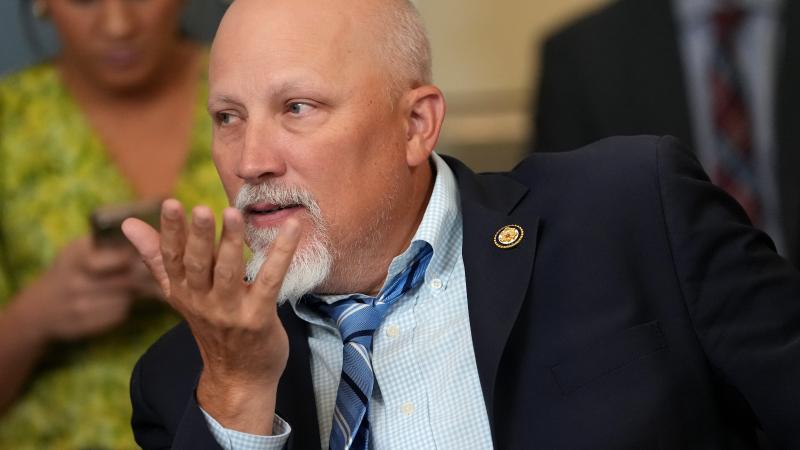SCOTUS nominee Jackson argued Critical Race Theory should be considered during sentencing
Judge Ketanji Brown Jackson noted in a 2020 Martin Luther King, Jr. Day lecture that a book by Derrick Bell, "the godfather of Critical Race Theory," had been on her parents' "coffee table for many years."
Ketanji Brown Jackson, the appeals court judge nominated by President Joe Biden to the U.S. Supreme Court, has extolled the virtues of Critical Race Theory and once urged that it be considered during sentencing of defendants, according to evidence submitted to the Senate.
Jackson was confronted by Republican senators during her confirmation Tuesday about her past advocacy for CRT, her praise of the controversial 1619 Project by the New York Times and her role on the board of a private Washington, D.C. school where racial equity is engrained in the curriculum.
She insisted her support for CRT — which teaches a person's skin color detemines whether they will be oppressors or oppressed — would not affect her decisions as a judge. CRT "doesn't come up in the work that I do as a judge," she told Sen. Ted Cruz (R-Texas) during a pointed exchange.
However, according to Jackson's Senate Judiciary Committee Questionnaire, Jackson lectured in 2015 on "fairness in sentencing," during which she mentioned how she believes CRT plays a role in sentencing.
"I also try to convince my students that sentencing is just plain interesting on an intellectual level, in part because it melds together myriad types of law — criminal law, of course, but also administrative law, constitutional law, critical race theory, negotiations, and to some extent, even contracts," she was quoted as saying.
"And if that's not enough to prove to them that sentencing is a subject worth studying, I point out that sentencing policy implicates and intersects with various other intellectual disciplines as well, including philosophy, psychology, history, statistics, economics, and politics."
Jackson also noted in a 2020 Martin Luther King, Jr., Day lecture that a book by Derrick Bell, "the godfather of Critical Race Theory," had been on her parents' "coffee table for many years."
"Dr. Janet Bell's late husband, Professor Derrick Bell, who was a civil rights lawyer and the first tenured African-American professor at Harvard Law School, wrote a book in the early 1990s about the persistence of racism in American life that he entitled 'Faces At the Bottom of the Well.'
"My parents had this book on their coffee table for many years, and I remember staring at the image on the cover when I was growing up; I found it difficult to reconcile the image of the person, who seemed to be smiling, with the depressing message that the title and subtitle conveyed. I thought about this book cover again for the first time in forty years when I started preparing for this speech, because, before the civil rights gains of the 1960s, black women were the quintessential faces at the bottom of the well of American society, given their existence at the intersection of race and gender — both of which were highly disfavored characteristics."
In the same lecture, Jackson said that she drew "heavily" from Dr. Janet Bell's "excellent insights."
She later highlighted The New York Times' "1619 Project," which claims that America’s founding began not in 1776, but in 1619, when the first slave was brought over.
"In the series — which has also been published as a podcast — acclaimed investigative journalist Nikole Hannah-Jones (who happens to be a black woman) explains that the men who drafted and enacted the Constitution founded this nation on certain ideals: freedom; equality; democracy.
"Yet, at the time they formulated these principles, the institution of slavery already existed in the colonies — ever since the year 1619, when 20-to-30 Africans who had been captured in their homeland arrived in the colonies by ship and were exchanged for goods. Jones highlights the irony of the situation even further when she notes that at the very moment that Thomas Jefferson penned the self-evident truths of the Declaration of Independence, a black relative — a slave — had been brought into his office to serve him."
Several senators challenged Jackson on her past statements during the first two days of the hearing.
"You have praised the '1619 Project,' and you have made it clear that you believe judges must consider Critical Race Theory when deciding how to sentence criminal defendants," Sen. Marsha Blackburn (R-Tenn.) said. "Is it your personal, hidden agenda to incorporate Critical Race Theory into our legal system? These are answers that the American people need to know."
But her exchange with Cruz over her school board service created one of the memorable exchanges during the day.
Jackson has since 2019 served on the Board of Georgetown Day School (GDS), where one of her two children attends.
GDS has a Diversity, Equity, and Inclusion Office, an anti-racism action plan for the school, and provides "family and educator anti-racist resources" on its website.
The school also allows 2nd graders to "explore and claim their identities in a yearlong multidisciplinary study and project," while 4th graders lead the annual Free to Be Me Assembly, which "celebrates all kinds of families, self-determination, LGBTQ+ pride, inclusion, and comprehensive belonging."
In the winter 2019-2020 GDS magazine, Jackson said that since she and her husband had joined the school's community seven years earlier, they had "witnessed the transformative power of a rigorous progressive education that is dedicated to fostering critical thinking, independence, and social justice."
Cruz pressed Jackson, listing books related to race and ending policing that he said are part of the GDS curriculum and asked Jackson if she thinks CRT should be taught at the private school.
"I don't know," Jackson said. "The board does not control the curriculum. The board does not focus on that."















